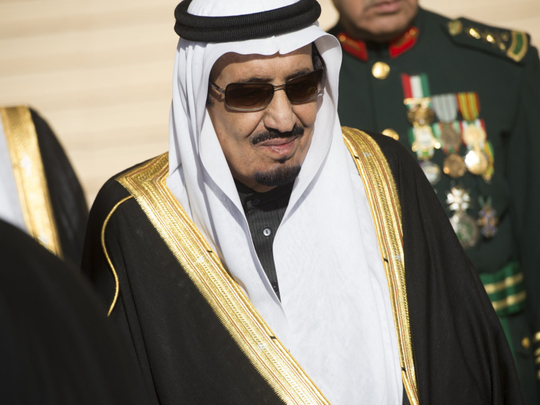
In a recent Independent column, Robert Fisk asked: “How long can our western leaders go on stroking and purring and fawning over — and arming — these Croesus-like autocrats?” in Saudi Arabia, concluding the “poor old Kingdom” will soon face calamities galore. “The revolution that threatens the monarchy,” opined Fisk, “will not come from Iran. Nor from Saudi Arabia’s own Shiite minority, nor the country’s armed Wahhabists. It will come from within the royal family,” advancing the kind of fantasy that preoccupied observers for at least six decades, but always withered on the vine.
Richard Haass, the president of the Council on Foreign Relations in New York and a former State Department official, held forth that “the internet, more than bombs, could be the government’s undoing,” since, apparently, the smooth transition we witnessed last week was mere theatrics. “Appearances can be deceiving,” wrote Haass in his Financial Times article, informing his readers that “Saudi Arabia faces long-term questions over political leadership and myriad immediate challenges,” affirming that the “succession issue has been shelved, not solved”.
In purely amateurish language that illustrated why we often get it wrong, Fisk, Haass and others displayed misunderstandings galore in the rush to anticipate gloom and doom, jumping to conclusions that were highly questionable. The first advanced the notion that Arabs have to allegedly tolerate “Saudi Arabia’s Wahhabi ethics — the most purist, anti-apostate extremism and a ruling family of thousands whose cult-like worship was founded by a violent 18th-century Muslim preacher,” even if no such edict existed. The second pretended to possess superior geopolitical insights as he identified innate shortcomings that would add pressure on the “new collective leadership”, presumably “hamstrung by the existence of strong political fiefdoms and a relatively weak centre”. Mercifully, David D. Kirkpatrick answered both in a New York Times article that saw how “Saudis expanded their regional power as others faltered”.
What surprised analysts watching the Kingdom this past week was the speed with which King Salman Bin Abdul Aziz confirmed the heir apparent’s designation, coupled with the pick of the heir to the heir apparent. If Prince Muqrin Bin Abdul Aziz was expected to fill his sovereign’s previous post whenever the latter acceded the throne, there was no consensus as to who might be designed second heir, or when that appointment would be made. Prince Mohammad Bin Naif was certainly one of the top contenders for the post, though few were privy to internal deliberations that led to his selection.
Still, what disappointed observers, with David Hearst going bonkers with his ‘A Saudi Palace Coup’ that was long on imagination but short on facts, was how uneventful the succession process turned out to be, without the sky falling over Riyadh. It was as if many were disenchanted that no gloom and doom materialised although we can now look forward to the government’s undoing because, wait for it, “a population that is young, poorly educated and underemployed” and which apparently resents the Kingdom’s “thousands of cosseted princes”, will surely revolt before long.
Succession mechanism
In reality, the most critical aspect of Saudi succession was the winnowing of the sons of the founder, which the late king Abdullah resolved by choosing Prince Muqrin as heir to the heir apparent. Rather than shelving it, senior Al Saud decision-makers resolved the succession mechanism definitively, because Prince Naif, a grandson of King Abdul Aziz, will now be the first member of the next-generation to take over. Given that he is only 55, and given that the Al Sauds have a happy proclivity for old age, this should mean that Riyadh could well have at least another three decades or more to work out who succeeds King Mohammad Bin Naif.
For sure King Salman is now confronted by a slew of challenges, including domestic contests, though he and his family know that the overwhelming majority of Saudis back them and are loyal to the ruling family. Unlike those who are salivating at the prospect of a 30-year-long Sunni-Shiite war, Saudi Arabia does not want to embark on this bandwagon and may be expected to do everything in its power to prevent such an outcome. In fact, what King Salman avowed a few days ago was his utter commitment to the nation-state system and while the European experience that ushered in the Treaty of Westphalia, which confirmed nationhood under the protection of states, was not a panacea for all ills, this was still the only mechanism that ensured some peace and prosperity throughout the world.
Countries face challenges and leaders must rise up to the occasion as they lead nation-states, but to assume that the Kingdom of Saudi Arabia is similar to what ailed the European continent a few centuries ago is simply wrong. To conclude that Riyadh cannot manage its own affairs is an indication of total ignorance.
Dr Joseph A. Kechichian is the author of the forthcoming Iffat Al Thunayan: An Arabian Queen, London: Sussex Academic Press, 2015.










